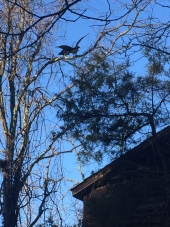








"You must be the change you want to see in the world." "First they ignore you, then they laugh at you, then they fight you, then you win." --Mahatma Gandhi
"Preach the Gospel always, and if necessary, use words." --Francis of Assisi.
"Family farms work when the whole family works the farm." -- Adam Klaus













christine lawson wrote:
Ooops, I'd better clarify - I'm wondering about ways to use them to enrich my soil. Should I leave them buried in the compost, or dig them up and rebury them within, say, the beds where I'm planning to put the leafy greens? I understand (I think?) they'll be a slow acting source of nitrogen - but I just don't know, that's why I need advice
C.
"You must be the change you want to see in the world." "First they ignore you, then they laugh at you, then they fight you, then you win." --Mahatma Gandhi
"Preach the Gospel always, and if necessary, use words." --Francis of Assisi.
"Family farms work when the whole family works the farm." -- Adam Klaus




R wannabe wrote:Do NOT put them directly in your beds.
Idle dreamer




Tyler Ludens wrote:
R wannabe wrote:Do NOT put them directly in your beds.
Aside from critters digging them up, what would be wrong with burying them in various places in beds? Not all in one hole, but here and there?
"You must be the change you want to see in the world." "First they ignore you, then they laugh at you, then they fight you, then you win." --Mahatma Gandhi
"Preach the Gospel always, and if necessary, use words." --Francis of Assisi.
"Family farms work when the whole family works the farm." -- Adam Klaus




Idle dreamer




R wannabe wrote:
Tyler Ludens wrote:
R wannabe wrote:Do NOT put them directly in your beds.
Aside from critters digging them up, what would be wrong with burying them in various places in beds? Not all in one hole, but here and there?
That is enough of a reason, but you will also get bugs that will move to your roots next. And I would never put animal product in my beds unless I was 1000% sure they were healthy.




"You must be the change you want to see in the world." "First they ignore you, then they laugh at you, then they fight you, then you win." --Mahatma Gandhi
"Preach the Gospel always, and if necessary, use words." --Francis of Assisi.
"Family farms work when the whole family works the farm." -- Adam Klaus




Idle dreamer




















Brenda
Bloom where you are planted.
http://restfultrailsfoodforestgarden.blogspot.com/




Brenda Groth wrote:myself I think I'd attempt to find a way to smash or crush them up..otherwise I'd follow the above advice





|
All of the following truths are shameless lies - Vonnegut
The new kickstarter is now live!
https://www.kickstarter.com/projects/paulwheaton/garden-cards
|






